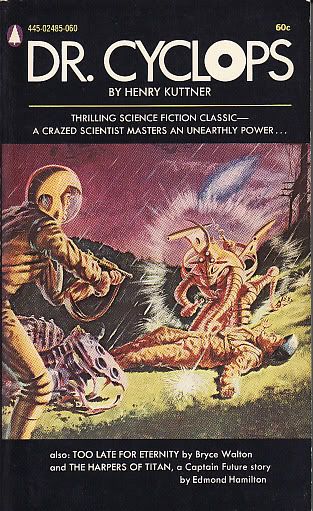Read a really weird 127 page anthology published by Popular Library - if you look at the spine, it says "Dr. Cyclops - Henry Kuttner" as thought it were a novel or collection. On the front and back covers, title page, and copyright page, it says "Dr. Cyclops by Henry Kuttner Including Too Late for Eternity by Bryce Walton and The Harpers of Titan by Edmond Hamilton" or similar, admitting it's an anthology but without any editor confessing to responsibility. And there's no copyright date except a note that the copyright on the Kuttner has been renewed by Popular Library in 1967. And the actual order of the stories is Kuttner/Hamilton/Walton. And the cover art illustrates nothing in any of the stories.
So we've got incompetent packaging. But what of the stories?
I bought it mostly for the Kuttner but also to read a Captain Future tale by Hamilton as I don't think I ever have before, though with no expectations about it. Imagine my surprise when the Kuttner is easily the worst of the three. It's still well-plotted and fairly exciting - a good light read - but this 1940 tale of a German mad scientist shrinking our protagonists as part of his experiments and trying to kill them all is really a silly example of a couple of often silly subgenres. But the surprises kept on surprising as I really enjoyed
"The Harpers of Titan" (1950). After writing a gazillion Captain Future novels in the 40s, Hamilton tacked on a few stories and this is one of them. It has quite a bit of Flash Gordony fun with the robot and the android and the brain-in-a-box who comprise the Futuremen around Curt Newton, aka CAP-TAIN FUUUTURE! but the tale is really vivid in its description of the eponymous critters and involves a remarkably thoughtful take on being a brain in a box as well as in a body. I dunno - I liked it. And then I didn't know Bryce Walton from Adam and figured
"Too Late for Eternity" (1955) must be lame filler but, while stark raving mad, it turned out to be thoroughly competent and effective. It's about how women live longer than men. Do they ever. The longevity difference started innocently enough but the gap continued to widen
And then the Third World War. Records, statistics destroyed. A lot of men destroyed too. And after that, three women for every man.
Matriarchy. The women had taken over. And a lot of those women hated men and hated science. Some of them formed anti-male cults. Who needs men?
They took over everything, Joad thought, lying there with his face pressed against the floor. Everything.
Joad is about 120 and comes home to find the young up-and-coming business exec he'd recommended to his wife in bed with her, as is natural when it's time for the old guys to be retired and the ever-youthful wife needs someone with more, um, stamina. Hilariously, in this matriarchy where women control everything, the morning after her wild night with her new guy, she makes both men breakfast. There are similar persistent 50s notes through this 2700ish matriarchy and the Freudian weirdness and misogyny is kind of staggering, though it is counterbalanced by an eventual misandry - let's just call it a general misanthropy. But a couple of aspects of the story really work. First, it's a completely whacked out future that has a compelling nature - like Pohl and Kornbluth on a bad day. Bad acid day. And the protagonist's pain and anger at getting old and being replaced and finally getting wise to how he's been programmed to accept everything - and how he doesn't accept it - is quite effectively portrayed. It's kind of the madman or Ancient Mariner effect of a guy grabbing you by the lapels and conveying a tale of lunacy with such intense conviction that it works. And he hits a lot of birds with this stone - age, sex (kinda shocking sex for '55, I'd think), gender, cults of beauty, pointlessness of some societal ambitions, the bad aspects of exaggerated masculine and feminine traits, etc. Wild stuff.
Anyway - so I totally got my
fifty cents worth from this.




